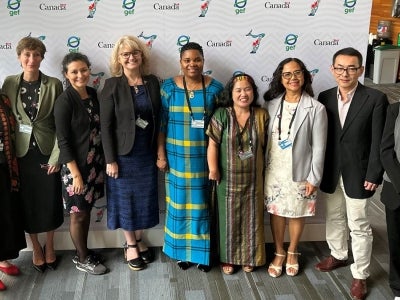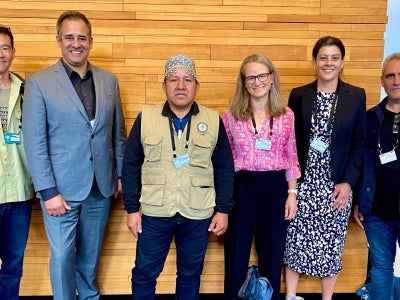International Women’s Day 2018: Transforming women’s lives and securing a more sustainable future

Women farmers in Indonesia havest rice
By Naoko Ishii
CEO & Chairperson
Global Environment Facility
It is increasingly evident that women’s involvement and leadership in environmental solutions has often been overlooked and that more must be done to empower women to help deliver successful and long-lasting results for the environment.
This year’s theme for International Women’s Day is “transforming women’s lives”, and we also need to consider the transformative role that women play in steering our planet towards a sustainable future.
Whether protecting biodiversity and ecosystems or adopting new practices to combat land degradation and pollution, women are advocating for innovative solutions to environmental problems. Investing in these women and supporting their equal participation and leadership is critical to addressing the environmental challenges that our world faces today.
One thing that the Global Environment Facility (GEF) has learned over the years is not to assume that environmental projects are gender neutral. When the GEF started to require gender analysis as part of the project planning, we realized that many projects perceived to be gender neutral were, in fact, gender blind. These projects failed not only to consider their differentiated impact on women and men, but also to explore opportunities to creating opportunities for both women and men to develop and support sustainable practices
At the GEF, we are committed to achieve greater impact by tackling the drivers of environmental degradation and contributing to systems change in key areas that impact the GEF mission, such as the food system, energy, urban and the production and consumption system.
Gender is deeply embedded in these socio-economic systems, and GEF recognizes that to effectively reduce the rate and scale of global environmental change and its consequences, efforts must be made to address interconnected drivers for unsustainability, exclusion and inequality. For these reasons, the GEF is working to make sure that our future projects are inclusive and gender-responsive. This effort involves actions on many fronts, such as promoting an equal voice in planning and decision-making among key actors, and creating opportunities for both women and men to develop and support sustainable energy, food and urban solutions.
The GEF’s new Policy on Gender Equality, approved by the GEF Council in November 2017, is one critical step to turn this ambition into practice.
The new Policy places the GEF approach to gender mainstreaming on par with current international best practices and translates this approach into concrete policy requirements that reflects the GEF’s ambition to:
- Shift from a gender-aware, “do no harm” approach to a gender-responsive, “do good” approach by requiring robust standards in the design, implementation and evaluation of GEF activities, and introducing measures that will allow GEF, over time, to better leverage strategic opportunities to address gender gaps critical to the achievement of global environmental benefits.
- Improve reporting on results by requiring project- and program-level monitoring and reporting on gender by Agencies, and portfolio-level monitoring and reporting on performance and results by the GEF Secretariat.
- Raise awareness and generate knowledge on lessons learned on promoting gender equality and the empowerment of women related to the environment and the GEF’s areas of work, with a view to informing programming in furtherance of this Policy.
These issues and how to translate this new commitment to action in GEF’s seventh programming cycle (GEF-7), will be discussed at a high-level round table on Gender that is scheduled to take place during the Sixth GEF Assembly in Da Nang, Viet Nam on June 27-28, 2018.


